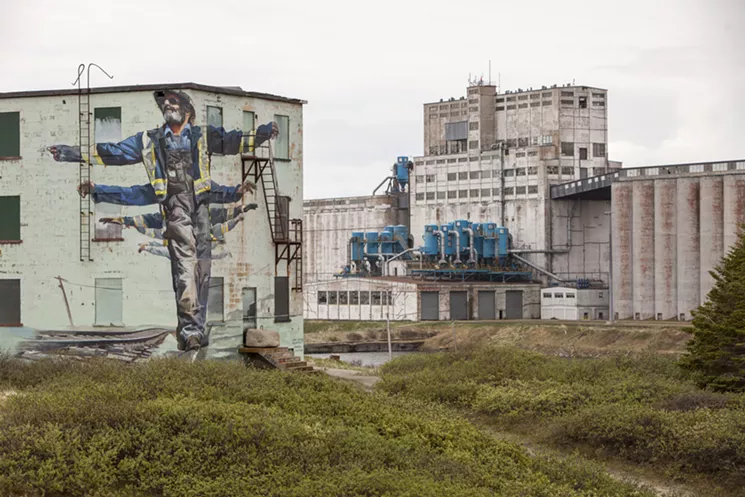OmniTRAX, a railroad and infrastructure company controlled by the Broe Group, which developed Country Club Towers, owns the one rail line that serves tiny Churchill, where the population of polar bears outnumbers that of humans. No paved roads lead directly to the town, which has a population of about 900 people. The line shut down in May after the melt-off from two blizzards that had walloped Churchill in March flooded the tracks, isolating it from the rest of the world.
High to begin with, the cost of groceries in the town on the southwestern shores of Hudson Bay has soared, as supplies must now arrive by plane. A liter of milk is $11, and six pork chops cost $36.
“We’re being held hostage here,” says Dave Daley, president of the Churchill Chamber of Commerce. “It’s really affecting every single person in the community and every single business.” Daley, who owns a dog-sledding business, says he is now paying $4,500 for a pallet of dog food, up from $800 when the railroad was running.
It’s not just the cost of basic supplies that’s been affected. The town had relied on the railroad to bring tourists in to view the abundant polar bears and beluga whales during summer months. This summer, there were no tourists.
In addition to the rail-line woes, OmniTRAX closed the Port of Churchill last August without warning, putting about sixty people out of work. The move pushed the port fees for cruise ships so high that they no longer bring tourists in, Daley says.
OmniTRAX purchased the rail line, the Hudson Bay Railway Company and the Port of Churchill from the province of Manitoba in 1997. In 2008, the Canadian and provincial governments each provided $20 million to the company, which was also expected to contribute $20 million, to upgrade the railroad. Under terms of the deal, OmniTRAX is responsible for the operation, maintenance and repair of the rail line through October 2018. “They took...taxpayers’ money to maintain and keep this line open,” Daley says.
But the rail line has been dormant since May 23, and OmniTRAX has said it won’t pay the $20 million to $60 million it estimates will be needed to repair the tracks. Circumstances have changed in ways that were not considered at the time the agreement was written, company officials explained. OmniTRAX has asked the Canadian government for help, saying that since the rail line is not commercially viable, it should be considered a public utility.

Golden resident Steve Green saw the washed-out tracks for himself.
Steve Green and Richard Whittaker
But the Canadian government has more to say. It has formally demanded that OmniTRAX fix the tracks, noting that it’s required to “operate, maintain and repair the entire Hudson Bay Railway Line in a diligent and timely manner until March 31, 2029.” And if the tracks aren’t fixed, the government is likely to seek repayment of $18.8 million it contributed to the Hudson Bay Railway in 2008.
This isn’t the first time the line has been shut down since it was acquired by OmniTRAX. Several years ago, the company tried to run a train that was too large for the tracks to handle. It derailed, shutting down the line for seven weeks.
According to Daley, an estimate that Churchill got from the Keewatin Railroad Company put the cost to repair the rail line at $2 million. Keewatin said the work could be done within 45 days.
And in June, Golden resident Steve Green and his friend Richard Whittaker hopped on their motorcycles bound for Churchill and saw the damage for themselves. They rode the tracks all the way into town, surprising residents who had been led to believe that the tracks were under water and couldn’t be navigated. “They were fooled by OmniTRAX, but we drove up the tracks and they weren’t under water,” says Green, who measured the places where the track was washed out and determined it was just 860 feet; the bridges were fine, he says. “I’m just surprised they can’t get the dang track going without having to go with this deluxe track.”

Artists arrived in Churchill to show their support by painting murals.
Steve Green and Richard Whittaker
“We want OmniTRAX out,” Daley says. “We want to re-nationalize this rail line — we want the government to take it over again and get back to business instead of being held hostage by Pat Broe and his cronies.”
Meanwhile, grumbling continues in central Denver. The city had approved Broe’s development agreement fifteen years ago, but the twin, 32-story Country Club Towers finally topped out this past February. They loom above Speer Boulevard, clogging traffic and throwing the historic Country Club Gardens, now also part of the Broe empire, in the shade.












